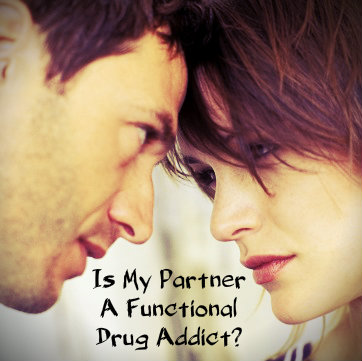Everyone has heard of the functional alcoholic. This is the person who drinks excessively, who needs to drink every day to quell withdrawal symptoms, but who can also go to work, maintain relationships, and keep a home life that is fairly steady and balanced. Is it also possible to be a functional drug user? Is there a difference between a functional drug user and a drug addict? And how can you tell what is going on with your spouse?
The Functional Drug User
 It is possible, at least for a time, for a drug user to be high functioning. If your spouse or partner uses drugs but still has a job, still meets your needs at home, still keeps up with responsibilities, and rarely experiences negative consequences related to drug use, your partner is functioning. Some of the most addictive drugs are difficult to use in such a way that functioning is still possible. For instance, heroin users are rarely functioning on any level other than a desire to get the next fix.
It is possible, at least for a time, for a drug user to be high functioning. If your spouse or partner uses drugs but still has a job, still meets your needs at home, still keeps up with responsibilities, and rarely experiences negative consequences related to drug use, your partner is functioning. Some of the most addictive drugs are difficult to use in such a way that functioning is still possible. For instance, heroin users are rarely functioning on any level other than a desire to get the next fix.
High-functioning drug users are more likely to be those that use marijuana, cocaine, prescription painkillers or amphetamines, or methamphetamine. If your partner uses drugs to get going in the morning, to relax after work, to cope with her emotions, particularly negative ones, or to get a boost of energy, she has a problem whether she is functioning or not.
Functioning And Addicted?
A functional drug user may not be an addict right away. If the drug use has not yet become compulsive or if your partner has not yet started to experience withdrawal symptoms, she may not yet be addicted. It is important to understand, however, that she is headed down a dangerous path.
If she continues to use drugs motivated by emotional reasons or the need to function during the day, she is headed down the path to addiction. Addicts can be high-functioning, and you may be watching your loved one gradually slide from casual drug use into addiction without noticing. The fact that she can function normally makes this transition difficult to catch.
Getting Help For Your High-Functioning Addict
It is very important for you and your partner to discuss her drug use. Whether you think she has become addicted or is still a casual user, she needs to stop using. Abusing drugs always carries the risk of addiction, no matter what her intentions are or how well she is functioning. No matter how strong-willed she claims to be about her drug use, it is possible that she will become dependent on her drug of choice.
Getting a functioning user to admit to having a problem is difficult. Denial runs deep in high-functioning addicts because they can always point to their lack of negative consequences to prove they don’t have a problem. If she lost her job, got in trouble with the law or was going broke feeding her habit, it would be easier to admit to having a problem.
Your job is to convince her that she is headed down a dangerous road, and that she may end up facing serious consequences if she keeps going; point to her motivations for using. Does she use drugs to cope with emotions she doesn’t want to recognize? Does she use because facing the day without drugs seems impossible? Does she need drugs to relax or to cope with stress? These are all the motivations of drug abusers and addicts. Help your partner to understand what she is doing and the possible harm it could cause in the long run.
Read About Functioning Addicts In The Media


